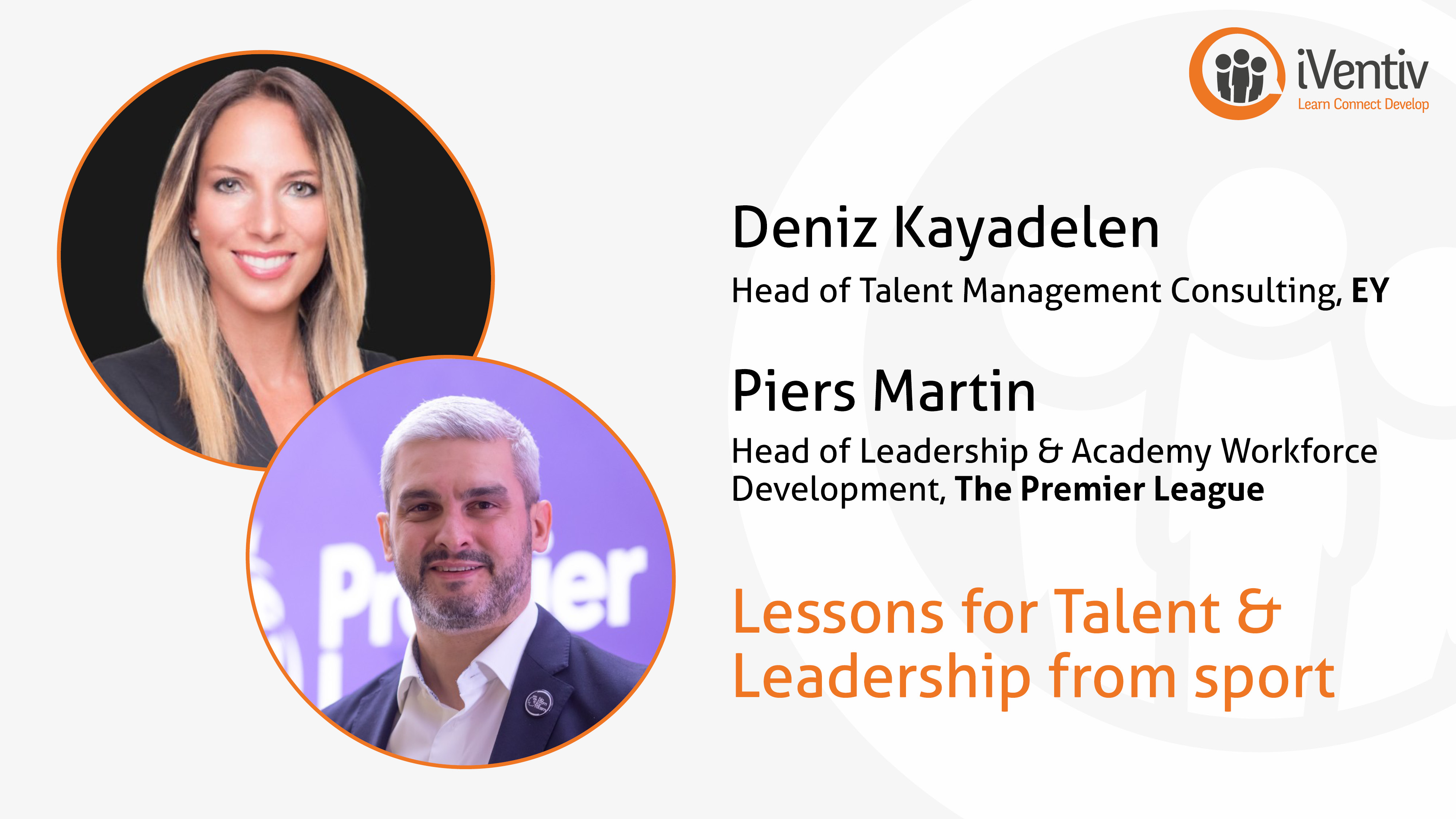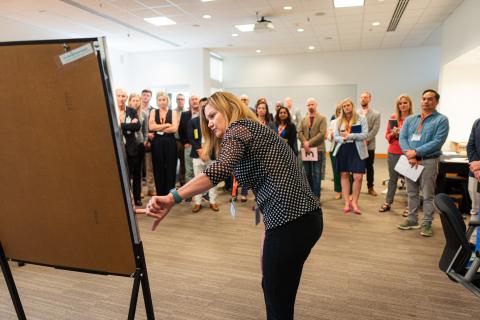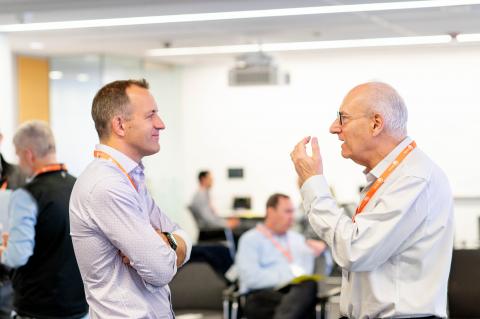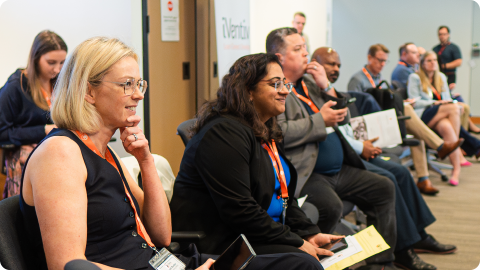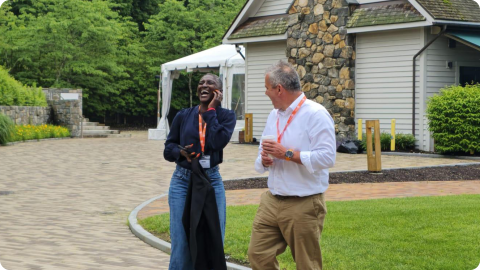Submitted by networkadmin on
What can business leaders learn from sport? Sportspeople are often praised for their endurance, focus, and resilience. These are qualities businesses increasingly feel are vital for their own leaders and, to explore the subject further, iVentiv Marketing Manager Richard Parfitt spoke to Deniz Kayadelen, Head of Talent Management Consulting at EY, and Piers Martin, Head of Leadership and Academy Workforce Development at The Premier League. Deniz is a Champion ice swimmer, consultant, and Talent Management expert. Piers is a business psychologist, leadership coach, and a former Chair of UK Deaf Sport, alongside his role at the Premier League.
How does the experience of taking part in sport help leaders to perform in a business context?
Piers and Deniz discussed the connection between participating in sports and performing as a leader in a business context. One key aspect that Deniz highlights is resilience. The ability to push through pain and discomfort, she says, is crucial in both sports and business. Taking part in sports helps individuals achieve a flow state and overcome inner obstacles, enabling participants to continue despite challenges.
Deniz also emphasizes that sports teach individuals how to control their minds and bodies, develop endurance, and maintain high performance in the long run. This perspective is applicable in the business world, where sustained success and managing energy become vital. Ultimately, she argues, participating in sports helps leaders learn valuable lessons in endurance, energy management, and long-term performance that can be applied in a business context.
What qualities do you see in sportspeople that make them good leaders?
The pair went on to explore the qualities sportspeople have that contribute to their effectiveness as leaders. Piers explains how, often, sportspeople possess a certain "aura" that can lead to the assumption that they would excel in business due to their discipline and resilience. But this isnt always the case. Sporting success, Deniz notes, often requires putting yourself through moments of pain. Do good leaders do that with their own teams? For Piers, similarly, it is therefore self-awareness that can be the most important quality for successful leaders in elite sport and business, because they understand themselves, the people they work with, and the ever-changing environment.
Piers and Deniz also talked about the importance of adaptability. Sportspeople are skilled at adjusting to different circumstances and seeking continuous improvement in themselves and others. Deniz explains that moving into leadership roles outside of sports requires learning how to manage people effectively within a new context. Setting "clear targets", having a "growth mindset", and seeking feedback can be essential traits derived from sports that can be valuable in business leadership, she says. Further, immediate feedback in sports allows athletes to reflect and plan for improvement, similar to the planning and self-reflection required in business. Both Piers and Deniz agreed that, overall, sportspeople bring qualities such as goal-setting, adaptability, self-awareness, and a drive for continuous improvement to the table that can make them effective leaders in various contexts.
Do you find businesses and leaders are receptive to the idea of adopting ideas from sports psychology?
Deniz shared her experience of organizing a Talent Roundtable event where clients from various sectors were receptive to applying sport psychology methodologies in a business setting. She highlights the importance of understanding the holistic nature of human potential, encompassing psychology, mindset, and physical well-being. The rise of well-being offerings in companies, she says, is one trend that reflects the influence of sports psychology in maximising performance and promoting a healthier work environment. Sport in that sense, could be said to have led the way.
Piers then discussed the challenge faced by athletes transitioning into coaching roles, who find that they need to develop empathy and adjust their leadership style. He talks about the difficulty of the transition from being an athlete to a manager or leader and highlights the need for support and understanding during this process, cautioning against solely adopting sports psychology principles, and advocating for a merger of sports psychology and business/organizational psychology to effectively support individuals in leadership roles. The importance of self-awareness, adaptability, curiosity, and performance-oriented mindset in athletes can be valuable for success in leadership positions, Deniz and Piers agreed, but that is not to say that performance in sport automatically translates to leadership.
What lessons can business take from sport (or vice versa) on shared challenges such as diversity, mental health, and psychological safety?
Piers discussed the lack of diversity in managerial and executive positions in sport, as compared to the playing level. He explains how, in his view, effective EDI is about recognising and valuing individual differences, rather than approaching diversity as a mere checklist. In elite sports, the focus is on identifying and leveraging the unique qualities and strengths of individuals to optimise performance: the best athletes are the fastest, strongest, or most skillful. This mindset, Piers argues, if applied to business, could lead to greater success.
Deniz agrees, highlighting the significance of understanding different personalities, motivational factors, and core values in teams, whether in sports or business. She reiterates the need for diversity to harness both structured and creative thinking, while also compensating for each other's strengths and development areas. Piers adds that it is crucial to give people the opportunity to adapt and showcase their abilities, cautioning against biased views and pigeonholing individuals based on stereotypes. Self-awareness, openness to feedback, and a growth mindset, he and Deniz agree, are essential for leveraging diversity and fostering a culture of continuous improvement. Both sport and business can benefit from embracing individual differences, valuing diversity, and creating an environment that promotes psychological safety and personal growth.
Which sportsperson do you think would make the best leader in business?
Asked who in sport would make the most effective leader in business, both Deniz and Piers were clear that it depends on the particular leader, the particular business, and the particular context. There isn't a single best leader or leadership style that suits all employees universally, and Deniz emphasises that organisations need a diversity of values and styles.
Piers, meanwhile, suggests that while figures like Gareth Southgate or Sarina Wiegman may be successful leaders in their field, their effectiveness would depend on the specific business context. Is the business a startup? A global corporation? What industry is it in? Different sportspersons possess distinct personalities and strengths that align with various business requirements. For example, he says, Nick Kyrgios, known as a disruptor, might excel in an entrepreneurial and creative setting, while Novak Djokovic may thrive in a technically demanding role. Piers finished by talking about his admiration for Jodie Ounsley, who, despite facing barriers as a deaf athlete, showcases exceptional resilience and the ability to raise awareness and inspire others. Jodie's self-awareness and talent for connecting with people make her a strong candidate for leadership. Ultimately, both Piers and Deniz were keen to highlight the need to consider individual qualities, adaptability, and the specific context when identifying a sportsperson who would excel as a business leader.
Deniz is the Head of Talent Management Consulting at EY. She is an M.Sc. Business Psychologist, certified transformative coach with extensive cross-cultural experiences in strategic HR Consulting, Workforce Transformation, Talent Management, Change Management, Learning and Coaching. She’s also a competitive extreme swimmer, inspirational speaker, and bestselling author of "Out of Comfort Zone" (available on amazon). https://bit.ly/43HjUV0
Piers Martin is Head of Leadership and Academy Workforce Development, at The Premier League. He has led and advised many Olympic and Paralympic sports, coached individuals and supported businesses from start-ups to established companies.
